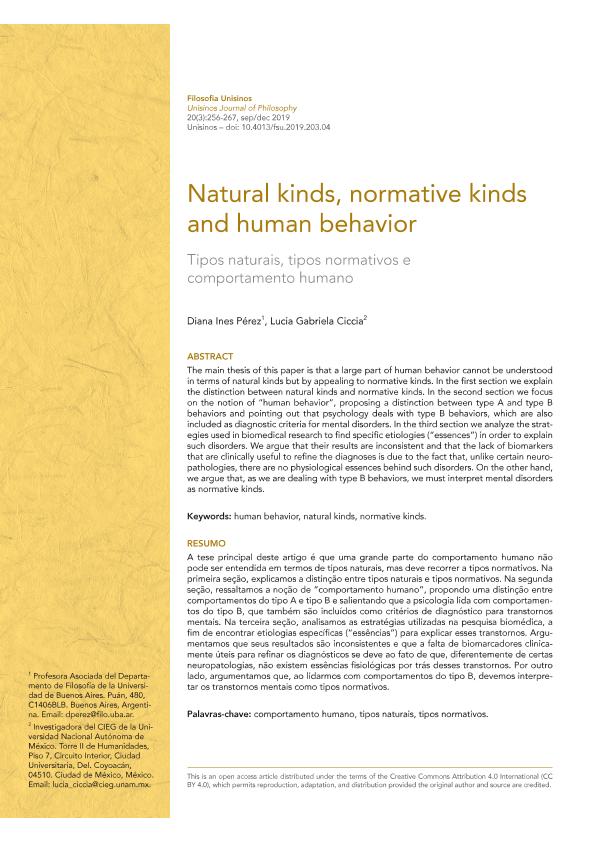Mostrar el registro sencillo del ítem
dc.contributor.author
Abatedaga, Maria Ines de Los Angeles

dc.contributor.author
Ciccia, Lucia Gabriela
dc.date.available
2021-03-08T13:38:04Z
dc.date.issued
2019-12
dc.identifier.citation
Abatedaga, Maria Ines de Los Angeles; Ciccia, Lucia Gabriela; Natural kinds, normative kinds and human behavior; Universidade do Vale do Rio dos Sinos; Filosofia Unisinos; 20; 3; 12-2019; 256-267
dc.identifier.issn
1519-5023
dc.identifier.uri
http://hdl.handle.net/11336/127716
dc.description.abstract
The main thesis of this paper is that a large part of human behavior cannot be understoodin terms of natural kinds but by appealing to normative kinds. In the first section we explainthe distinction between natural kinds and normative kinds. In the second section we focuson the notion of "human behavior", proposing a distinction between type A and type Bbehaviors and pointing out that psychology deals with type B behaviors, which are alsoincluded as diagnostic criteria for mental disorders. In the third section we analyze the strategiesused in biomedical research to find specific etiologies ("essences") in order to explainsuch disorders. We argue that their results are inconsistent and that the lack of biomarkersthat are clinically useful to refine the diagnoses is due to the fact that, unlike certain neuropathologies,there are no physiological essences behind such disorders. On the other hand, we argue that, as we are dealing with type B behaviors, we must interpret mental disordersas normative kinds.
dc.description.abstract
A tese principal deste artigo é que uma grande parte do comportamento humano não pode ser entendida em termos de tipos naturais, mas deve recorrer a tipos normativos. Na primeira seção, explicamos a distinção entre tipos naturais e tipos normativos. Na segunda seção, ressaltamos a noção de “comportamento humano”, propondo uma distinção entre comportamentos do tipo A e tipo B e salientando que a psicologia lida com comportamentos do tipo B, que também são incluídos como critérios de diagnóstico para transtornos mentais. Na terceira seção, analisamos as estratégias utilizadas na pesquisa biomédica, a fim de encontrar etiologias específicas (“essências”) para explicar esses transtornos. Argumentamos que seus resultados são inconsistentes e que a falta de biomarcadores clinicamente úteis para refinar os diagnósticos se deve ao fato de que, diferentemente de certas neuropatologias, não existem essências fisiológicas por trás desses transtornos. Por outro lado, argumentamos que, ao lidarmos com comportamentos do tipo B, devemos interpretar os transtornos mentais como tipos normativos.
dc.format
application/pdf
dc.language.iso
eng
dc.publisher
Universidade do Vale do Rio dos Sinos
dc.rights
info:eu-repo/semantics/openAccess
dc.rights.uri
https://creativecommons.org/licenses/by/2.5/ar/
dc.subject
HUMAN BEHAVIOR
dc.subject
NATURAL KINDS
dc.subject
NORMATIVE KINDS
dc.subject.classification
Filosofía, Historia y Filosofía de la Ciencia y la Tecnología

dc.subject.classification
Filosofía, Ética y Religión

dc.subject.classification
HUMANIDADES

dc.title
Natural kinds, normative kinds and human behavior
dc.type
info:eu-repo/semantics/article
dc.type
info:ar-repo/semantics/artículo
dc.type
info:eu-repo/semantics/publishedVersion
dc.date.updated
2020-11-06T20:26:04Z
dc.journal.volume
20
dc.journal.number
3
dc.journal.pagination
256-267
dc.journal.pais
Brasil

dc.description.fil
Fil: Abatedaga, Maria Ines de Los Angeles. Consejo Nacional de Investigaciones Científicas y Técnicas. Oficina de Coordinación Administrativa Parque Centenario. Instituto de Investigaciones Filosóficas. - Sociedad Argentina de Análisis Filosófico. Instituto de Investigaciones Filosóficas; Argentina
dc.description.fil
Fil: Ciccia, Lucia Gabriela. Universidad Nacional Autónoma de México; México
dc.journal.title
Filosofia Unisinos
dc.relation.alternativeid
info:eu-repo/semantics/altIdentifier/url/http://revistas.unisinos.br/index.php/filosofia/article/view/18120
dc.relation.alternativeid
info:eu-repo/semantics/altIdentifier/doi/http://dx.doi.org/10.4013/fsu.2019.203.04
Archivos asociados
